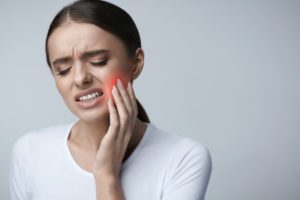Bruxism—or teeth grinding—happens when you grind your teeth or clench your jaw repeatedly. Many people grind or clench their teeth when they are under stress or angry. However, it is possible that you may not know you are grinding if it happens in your sleep. Bruxism can occur both while you are awake and during sleep.
While mild bruxism may not necessarily need treatment, grinding your teeth can have long-term effects. Over time, grinding your teeth can destroy your enamel. It will begin to wear it down and expose the sensitive parts of your inner teeth.
Additionally, grinding or clenching your teeth can cause chips or fractures, which a dentist will need to repair. Also, the shape of your teeth can change. The ridges that help chew your food can be worn down and flattened due to bruxism. Patients with bruxism are more likely to develop tooth decay because of enamel loss.

Potential Factors
Doctors don’t really know the root cause of bruxism. However, there are certain factors that can increase your chances of grinding your teeth.
Stress and Anxiety
Emotions can play a huge role in teeth grinding. While it may seem far-fetched to some, your anger or stress can greatly affect your oral health. Most of us are aware of the effects of stress on our bodies—heart issues, headaches, muscle tension, fatigue, etc. Additionally, it can affect the health of your teeth. Grinding or clenching your teeth is a common behavior for people under stress. In addition, people with anxiety also tend to clench their jaws.
If you have a high-stress job or anxiety, you may consider talking to your dentist.
Genetics
Unfortunately, your behaviors or lifestyle may not be the cause of your bruxism. A type of teeth grinding—sleep bruxism—is genetic rather than behavioral. This means that sleep bruxism is more likely to run in your family. Consequently, there is nothing that you can do to minimize this type of teeth grinding. You can really only talk to your dentist about a custom mouthguard to protect your teeth.
Additionally, there are a few sleep disorders that include bruxism as a side effect. If you wake up not feeling rested or have trouble concentrating throughout the day, consider talking to your doctor. They can recommend a sleep study.
Substances
While genetics and lifestyle have some factors in grinding your teeth, certain medications or substances can cause bruxism. For example, some antidepressants carry teeth grinding as a potential side effect. If this is the cause, you will want to talk to your dentist to help minimize the effects of bruxism.
Additionally, some other substances can increase your chances of developing bruxism. While coffee may be an essential way to get through your day, it can also be the cause of your teeth grinding. Caffeine can exacerbate the influence of bruxism.
Also, smoking tobacco is another substance that can increase your risk of teeth grinding. Along with smoking, drinking alcohol or consuming recreational drugs are potential risk factors for bruxism.
